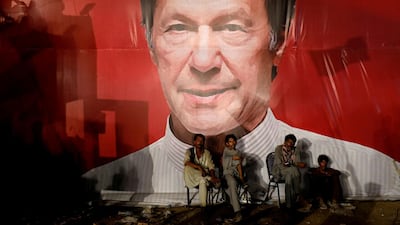Prime Minister Imran Khan hopes to ease the financial crisis threatening his lofty reform promises by persuading overseas Pakistanis to double the amount of money they send back home.
Pakistan's prime minister said he was drawing up incentives to encourage nationals abroad, including millions living in the Middle East, to boost remittances and provide vital foreign currency.
The country is gripped by deepening financial woes and last week bowed to pressure and began talks with the International Monetary Fund (IMF) for Islamabad's thirteenth bailout since the late 1980s.
The move marked an about turn for Mr Khan's government which had spent weeks trying instead to get loans from Saudi Arabia and China, only for them to baulk at the size of Islamabad's problems, economists said.
Any IMF bailout is now expected to come with tough conditions likely to dramatically rein in Mr Khan's promises to overhaul health, housing and education by building a welfare state in Pakistan.
Mr Khan said overseas Pakistanis were an asset that could improve the country's finances.
He said: “We are going to announce a special package of incentives to encourage [overseas Pakistanis] to send remittances through banking channels by removing all hindrances and procedural issues. Philippines did this successfully.”
“InshaAllah by removing these hindrances we will be able to increase remittance flows from $20bn to at least $30bn and perhaps even $40bn through banking channels.”
_________
Read more:
Pakistan demands answers over its nationals’ UAE property investments worth billions
Pakistan's Imran Khan struggles with shift from opposition candidate to incumbent
Pakistan's Khan says austerity begins at home
Is Imran Khan's austere inauguration a harbinger for Pakistan's future?
_________
He also vowed to crackdown on illegal land mafias preying on the property of Pakistanis living abroad.
An estimated 3.5 million Pakistanis live in the Middle East, including nearly 1.4 million in the UAE alone. The money they send back is a vital source of foreign currency in Pakistan, where reserves have plunged to the lowest in almost four years. Mr Khan's government has already floated the idea of creating new bonds to draw investment from overseas.
Pakistan's financial crisis has seen its current account and budget gaps dramatically widen leaving the country needing to urgently raise up to $12bn.
The scale of the need had sunk Mr Khan's hopes of avoiding the IMF by taking loans from China or Saudi Arabia, said Khurram Husain, business editor at Dawn, the leading English daily paper.
He said: “The sheer quantity in which the government needs resources is so large that no single bilateral partner can actually arrange for the entire amount.”
There has also been widespread speculation that Riyadh wanted Pakistan to join its military coalition in Yemen in return for money, which Islamabad decided was unacceptable.
“The Saudis nor the Chinese are bilaterally going to bail anyone out without expecting something in return for themselves,” he said.
The failure has left Mr Khan at the mercy of the IMF, which is expected now to demand painful reforms to break Pakistan's boom and bust cycle.
The Washington-based fund will be wary of Islamabad's failure to meet the conditions of past loans and America will have a large say in lending.
“Today's White House looks at Pakistan with great disappointment and they have made that disappointment clear,” said Mr Husain. “Clearly that unhappiness is going to spill over into the IMF programme.”
“I think the negotiations for an IMF programme will be quite tough this time around,” added Jeremy Zook, associate director of Fitch Ratings.
“I think the current US administration has a large say in IMF lending policies so I think they are likely to put a significant amount of pressure on Pakistan, probably more so than in the past.”
Cuts to public spending, devaluation of the rupee, ending subsidies to ailing state businesses and hiking taxes are all likely to be conditions of any bailout.
All of that will hit living standards and Mr Khan's high-spending campaign promises.
“History tells us that whichever government has undertaken the kind of macroeconomic stabilisation that this government is about to undertake has paid a heavy, heavy cost politically,” said Mr Husain.
“They are going to pay a very steep price in terms of their popularity.”
Pakistan's finances are likely to get worse before they get better and negotiations with the IMF could take months, said Charles Robertson, global chief economist at Renaissance Capital.
“I have to say I have a some sympathy for Imran Khan,” he said.
“No-one should want to take power against such a tough backdrop where the first thing you betray are your promises to your voters.”

